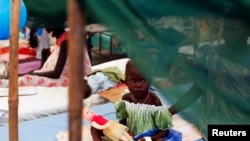South Sudan’s Agriculture Minister Beda Machar said Wednesday that the international aid effort and the onset of the rainy season have helped to avert famine in South Sudan this year.
But, he warned, if fighting continues, food security will be weakened again and more than 2.5 million people could face alarming levels of hunger at the beginning of next year.
“The government urges all the actors to scale up all their efforts in the coming months in order to prevent further... food insecurity and malnutrition within the Republic of South Sudan,” Machar said.
Machar made his plea for South Sudan and the international community to not let down their guard against hunger a day after an analysis of data from the Integrated Food Security Phase Classification (IPC) showed that food security in South Sudan has improved.
Famine is not predicted anywhere in South Sudan in the next three months.World Food Program
The IPC data show that the number of people at "crisis" and "emergency" levels of hunger – phases three and four on a five-point scale – has dropped to 1.5 million from 3.9 million.
"Famine is not predicted anywhere in South Sudan in the next three months," the World Food Program (WFP) said.
But, added the WFP: "The nutrition situation remains dire, with the prevalence of Global Acute Malnutrition (GAM) above emergency thresholds of 15 percent in most of the country."
The outlook for next year is also grim, the WFP and other aid agencies said.
"The threat of 'famine looming' ... is still there and could happen towards January, February," when the dry season begins and food stocks are likely to run out, said Wendy Taeuber, the South Sudan director of the International Rescue Committee (IRC).
Taueber said there is also an immediate need that has to be met in South Sudan.
"I think the risk with the good news is that donors and international stakeholders may feel that things are OK, but we need to remember that just because famine is averted doesn't mean people aren't still hungry," she said.
"People are still suffering... 1.5 million people are still in crisis and emergency phases," she said.





